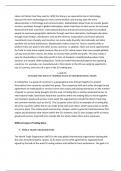ideas a lot faster than they used to. With this there is an exponential rise in technology,
because the more technology the more communication and sharing, then the more
advancements in Technology and communication. Globalization allows Tesla to transfer goods,
services, and ideas through a global marketplace, which help them to have access to increased
demand from their customers. International business enhanced communication has enabled
people to overcome geographic obstacles through real-time interaction. Exchanges take place
through local vendors, distributors, and via the Internet. Corporations can finance physical
investments more cheaply, and investors can more easily diversify internationally and tailor
portfolio risk to their preferences. Globalisation makes it easy for Tesla to transfer skills or
workers from one plant to the other across countries. In addition, there are more opportunities
for Tesla to raise share capital, because they are a PLC, which means that more people globally
can buy and sell their shares, this helps to increase their profile and profit. This also makes it
easy for shareholders to take their profit in form of dividend, notwithstanding where Tesla
factories are located. With trading blocs Tesla can trade frictionlessly between the operating
countries. For example, cars manufactured in their plants in the UK can easily be exported to
any EU country, since the UK is part of the EU trading bloc.
L.A.B p4;
Explore the role of trading blocs on international trade
A trading bloc is a group of countries in a geographical area that get together to protect
themselves from countries outside their group. They cooperate with each other through formal
agreements to make goods or services move more easily and placing restrictions on the number
of goods or services being brought into the area. A trading bloc is another potential barrier to
international trade. Businesses help these countries within the trading blocs to work together
and transport goods and services more easily the organisations include the World Trade Org
and common markets such as the EU .The European Union (EU) is an example of a trading bloc.
All of the countries within the EU can trade freely with each other, which means that no tariffs
are put in place. This makes goods and services cheaper, which is good for both businesses that
export and businesses that import within the EU. However, the EU also charges tariffs on many
goods and services imported from outside the EU, which makes them more expensive.
Different types of trading blocs:
➔ World Trade organisations
The World Trade Organization (WTO) is the only global international organisation dealing with
the rules of trade between nations. At its heart are the WTO agreements, negotiated and
signed by the bulk of the world’s trading nations and ratified in their parliaments. The goal is to
, help producers of goods and services, exporters, and importers conduct their business. The
WTO ensures that countries can trade with each other as smoothly, predictably and freely as
possible so that businesses can sell their goods and services globally around the world. The
WTO has 160 member countries and these countries are responsible for approximately 95% of
all world trade that takes place. More countries are joining the organisation as it helps
businesses to trade more easily. The WTO aims to help people throughout the world to trade
effectively with each other by keeping costs low and ensuring that countries trade fairly with
others, as well as maintaining the health of their populations and the world environment
WTO objectives:
➔ Resolve disputes involving trade
➔ Help developing countries benefit from global trading systems
➔ Enforce rules for trading internationally
➔ Provide a forum for negotiating and monitoring further trade liberalisation
➔ Cooperate with other major international economic institutions involved in global
economic management
As part of its mission, the WTO protects the interests of small countries against the trade
practices of large and stronger nations. By reducing living costs and raising living standards,
settling disputes, reducing trade tensions, stimulating economic growth and employment,
reducing the cost of doing business internationally, encouraging good governance, supporting
countries in developing and contributing to peace and stability, the WTO can reduce living costs
and raise living standards.
➔ Customs unions and common markets
In areas of the world, custom unions and common markets have been established to allow free
trade to take place between those different countries. In which means no tariffs are charged on
goods and services moving within the area. It adds on a common external tariff on all products
flowing from countries outside the customs union, unless specific trade deals have been
established. Revenues from import tariffs are combined for all member states. The countries in
a customs union negotiate as a bloc when discussing trade deals with countries outside the
union. A good example is the recently introduced bilateral trade deal between the European
Union and Japan.
The EU




